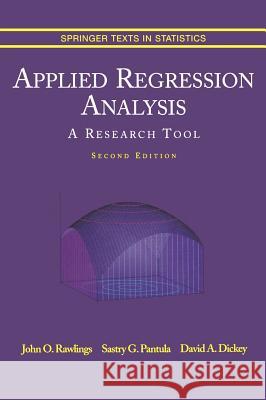Applied Regression Analysis: A Research Tool » książka
Applied Regression Analysis: A Research Tool
ISBN-13: 9780387984544 / Angielski / Twarda / 1998 / 660 str.
Least squares estimation, when used appropriately, is a powerful research tool. A deeper understanding of the regression concepts is essential for achieving optimal benefits from a least squares analysis. This book builds on the fundamentals of statistical methods and provides appropriate concepts that will allow a scientist to use least squares as an effective research tool. This book is aimed at the scientist who wishes to gain a working knowledge of regression analysis. The basic purpose of this book is to develop an understanding of least squares and related statistical methods without becoming excessively mathematical. It is the outgrowth of more than 30 years of consulting experience with scientists and many years of teaching an appied regression course to graduate students. This book seves as an excellent text for a service course on regression for non-statisticians and as a reference for researchers. It also provides a bridge between a two-semester introduction to statistical methods and a thoeretical linear models course. This book emphasizes the concepts and the analysis of data sets. It provides a review of the key concepts in simple linear regression, matrix operations, and multiple regression. Methods and criteria for selecting regression variables and geometric interpretations are discussed. Polynomial, trigonometric, analysis of variance, nonlinear, time series, logistic, random effects, and mixed effects models are also discussed. Detailed case studies and exercises based on real data sets are used to reinforce the concepts. John O. Rawlings, Professor Emeritus in the Department of Statistics at North Carolina State University, retired after 34 years of teaching, consulting, and research in statistical methods. He was instrumental in developing, and for many years taught, the course on which this text is based. He is a Fellow of the American Statistical Association and the Crop Science Society of America. Sastry G. Pantula is Professor and Directory of Graduate Programs in the Department of Statistics at North Carolina State University. He is a member of the Academy of Outstanding Teachers at North Carolina State University. David A. Dickey is Professor of Statistics at North Carolina State University. He is a member of the Academy of Outstanding Teachers at North Carolina State University.











